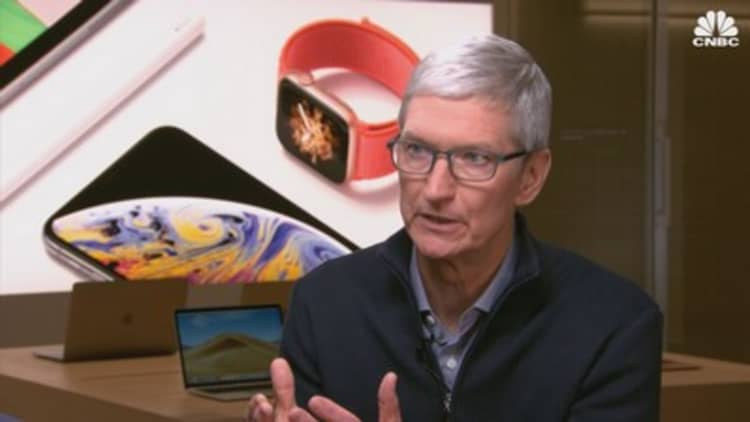As Apple falls on news of weak iPhone sales in China, there is still one more shoe that could drop in the country that would push consumers there even further away: The possible extradition from Canada of Meng Wanzhou, CFO of the country's largest consumer hardware manufacturer, Huawei.
The Justice Department has not yet filed detailed paperwork to request Meng, who is now out on bail in Vancouver, be extradited to the U.S. to stand trial on allegations of fraud over Iran sanctions. The DOJ has until the end of January to file the paperwork under Canada's extradition agreement with the U.S.
Several media outlets have surfaced anecdotal reports of consumers in China already rejecting Apple products because of the dispute. But in an exclusive interview with CNBC on Wednesday, Apple CEO Tim Cook downplayed concerns that negative sentiments about American products might be playing a role in the weaker-than-expected sales in China.
"There are reports, sort of sporadic reports, about somebody talking about not buying our products because we're American, maybe a little bit on social media, maybe a guy standing in front of a store or something," Cook said. "My personal sense is that this is small. Keep in mind that China's not monolithic. Just like America's not monolithic. You have people with different views and different ideas. And so do I think anybody elected not to buy because of that? I'm sure some people did. But my sense is the much larger issue is the slowing of the economy and then this — the trade tension that's further pressured."
But Apple could be sustaining longer-term reputation and brand damage among Chinese consumers who may increasingly be associating its products with the big-picture legal actions undertaken by the U.S. government.
Apple's biggest Chinese rival
That's because Apple isn't just another American company that sells goods to China. It's Huawei's biggest American rival in the mainland.
And while Apple's suppliers are certainly feeling the crunch in their stock price from Apple's lackluster business in China, — with big stock drops Thursday from Qorvo, Skyworks Solutions and Corning on Thursday — makers of other consumer goods, such as Nike, are seeing sustained popularity in the country.
Huawei's products have competed fiercely with the iPhone in China for years. At the same time, the U.S. government has long accused Huawei and its competitor ZTE of colluding with the Chinese government to take part in anti-competitive practices.
Those have included sanctions violations like those alleged in the Meng affair, as well as intellectual property theft and even spying. And while the Chinese government is not looking to ban iPhone products, according to Cook, the U.S. has put several restrictions in place on Chinese hardware.
Chinese businesses, however, have denied these claims. Further, they've said that the U.S. legal and intelligence communities are biased in favor of American businesses. ZTE said Wednesday said it had brought on former Sen. Joe Lieberman as a lobbyist to lead efforts in testing equipment over national security concerns. In late December, Reuters reported the U.S. government is also mulling wider-scale bans of Huawei and ZTE products in the United States.
Tensions over the issues show no signs of abating, and the U.S. State Department released a new China travel warning Thursday, highlighting the country's increasing use of "exit bans" that prohibit U.S. citizens from leaving the country over issues like alleged investigations or debts.



